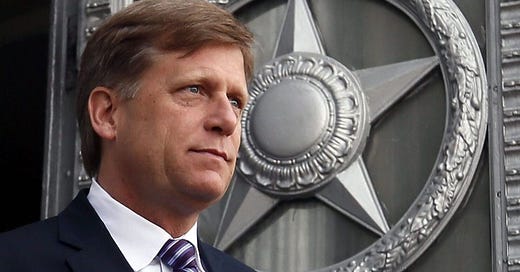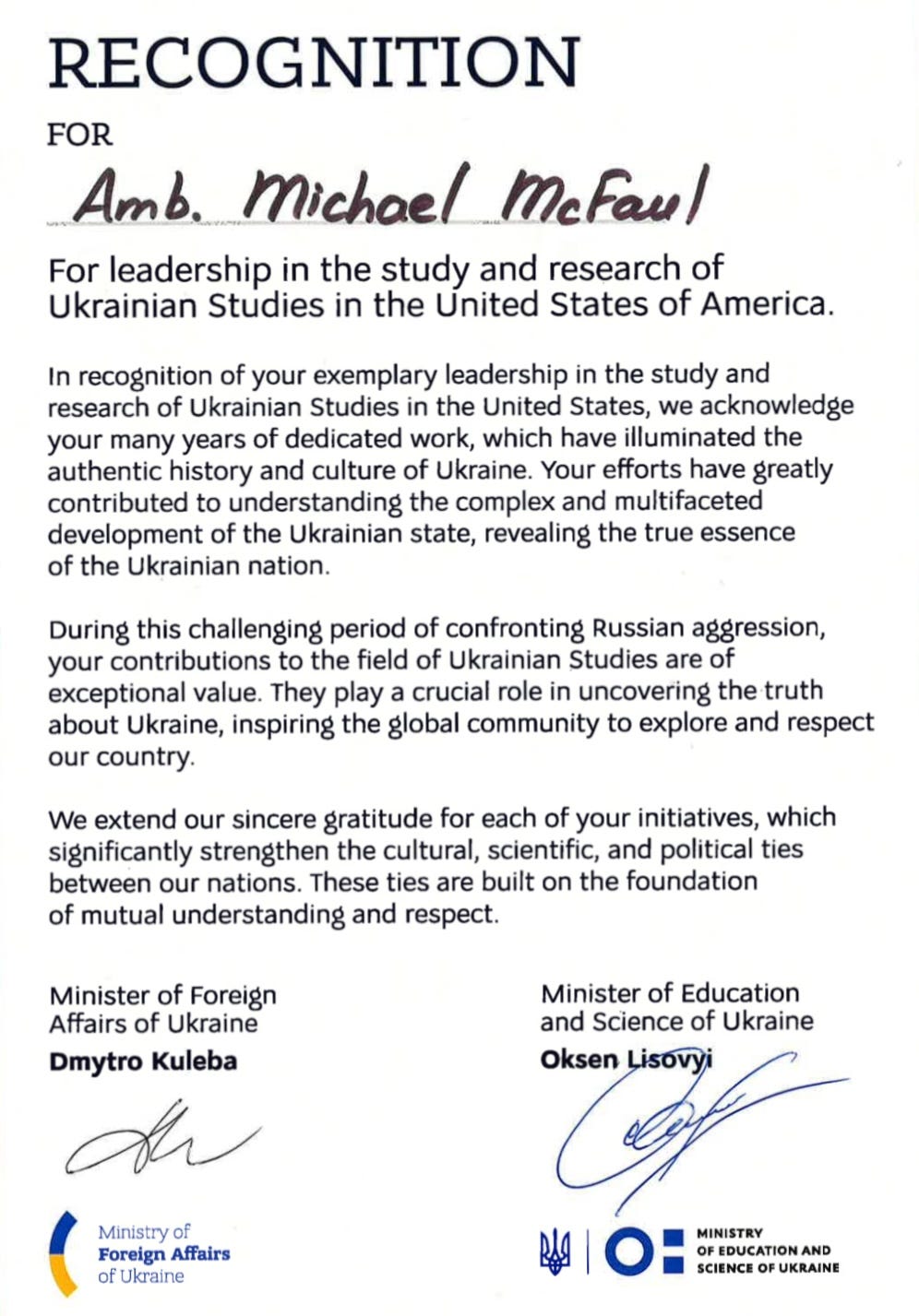Dear Friends and Colleagues,
This month, one of our centers at FSI, the Center on Democracy, Development and the Rule of Law, welcomed 27 fantastic democracy activists from 21 countries as part of the 2024 Fisher Family Summer Fellows on Democracy and Development. This year, we also have four Ukrainian fellows who are jointly participating in CDDRL’s Strengthening Ukrainian Democracy and Development Program to develop actionable ways to support Ukraine’s recovery from Russia’s invasion.
As part of the program, I delivered three lectures: (1) Foreign Policy Debates in the U.S. 2024 Election, (2) Advancing Democracy Abroad: Should We? Can We?, and (3) Great Power Competition in the 21st Century. (Happy to send slides!) As much as I got to teach, I also learned a ton from the fellows. For instance, the day after the results of Venezuela’s election were announced, Héctor Andrés Fuentes, a lawyer and human rights activist, delivered a terrific update, highlighting that Maduro’s opposition is very well organized and that about 25% of the Venezuelan people are looking to leave the country should Maduro’s regime continue.
As you may already know from my recent Substack post, last week, three Americans, several Russian freedom fighters, and five German citizens gained a new lease on life after the competition of the most complicated swap in the history of Russia’s relations with the United States and Europe. Read my piece here, or watch my numerous appearances on MSNBC here or here (I had 19 TV hits on MSNBC that day)!
Earlier in July, I attended the opening ceremony of the 75th NATO Summit in Washington and then participated in numerous sidelines events with US and European officials. The biggest success of the summit was NATO’s commitment to supporting Ukraine on its “irreversible” path to full euro-Atlantic integration, including NATO, as outlined in its final communiqué. Another success is that NATO has decided to establish the NATO Security Assistance and Training for Ukraine, otherwise known as NSATU, to coordinate the provision of military equipment and training for Ukraine by Allies and partners. This is a great achievement, though a horrible acronym!
Prior to the summit itself, I commented on its expected outcomes and implications on Voice of America. I also wrote in Foreign Policy that the NATO Summit was a “big win for Biden.” On NBC News, I discussed Ukraine’s path to NATO membership and what a second Trump presidency could mean for the Russia-Ukraine war. Read my full report from the NATO Summit here.
While in DC, I also spoke at the Stronger Together: U.S.-Ukraine Partnership in Education and Science conference, organized by the U.S. National Academy of Sciences, where the First Lady of Ukraine, Olena Zelenska, delivered the keynote. At this event, I was very honored to receive a letter of recognition from Ukrainian Foreign Minister Kuleba and Minister of Education Aksen Lisovyi “For leadership in the study of research of Ukrainian Studies in the United States of America.”
The biggest news from this month was that Vice President Harris has become the presidential candidate of the Democratic Party. On Substack, I wrote about Harris’s views on Russia, Ukraine, and Belarus. I predict that should Harris win the election, Europe, and especially Ukraine, will be in great hands! I also talked about internal conflicts in the Democratic Party and plans for Harris and helped Politico reporters with writing a feature about my former Obama administration colleague and current National Security Advisor to VP Harris, Phil Gordon. Check it out here.
I continue to coordinate the International Working Group on Russian Sanctions and remain in close contact with my Ukrainian colleagues. In June, we published our latest (20th) paper, Export Controls: A Key G-7 Tool to Halt Russia’s War. As always, we are looking for new ideas, so if you have any, please share!
In July, I also hosted two episodes of FSI’s World Class podcast. Estonia’s Ambassador to the U.S., Kristjan Prikk, discussed Estonia’s view on the Russian military, Putin’s nuclear threats, and the long-term impact of the Ukraine war on European security. Ambassador Susan Rice shared lessons learned during her long career in government and policy-making.
At FSI, we have many more events coming up. To stay updated on events, opportunities, and policy recommendations by scholars at the Freeman Spogli Institute for International Studies, please sign up for FSI email blasts and follow us on LinkedIn. As always, feel free to share your comments on the content below and any suggestions for improving this newsletter. To sign up for the newsletter, please click here. I hope you join us here at FSI and Stanford for our amazing events!
Keep in touch,
Mike







Dear Prof. MdFaul:
In reading qome of your written works that you have published in "McFaul World," I have observed a cognitive error under which you mistake "complex" physical systems for "non-complex" physical systems in constructing models of these systems, where a "complex" physical system exhibits one or more "emergent properties," each of which is a property of the whole system and not of the separate parts of this system whereas a "non-complex" physical system exhibits no such property. In the book that is sntitled "The Psychhology of Totalitarianism," the statistician and professor of clinical psychology Mattias Desmet reports that he has discovered in the historical literature that for a large group of the citizens of a given country to make this mistake is a precursor to totalitarian rule over this country. In a related study, the results of which he also reports in "The Psychology of Totalitarianism," Prof. Desmet found that this mistake has resulted in a "replication crisis" in academia and elsewhere under which the model-predicted outcomes of the conditional outcomes of the events of the future fail to replicate when tested against statistically independent data.
This mistake that you have been making is consistent with your cheering for the election of Democratic Party candidates for public office, your high regard for them being the result of mistaking "complex"
physical systems for "non-complex" physical systems in constructing models of these systems. Absent this
mistake, the Platform of the Democratic Party is revealed to be a precursor to totalitarian rule over the
people of the United States.
Means for avoidance of this mistake in the construction of a model of a "complex" physical system were invented, circa 1965, by Ronald Arlie Christensen, then a PhD candidate in the theoretical physics
program of the University of California, Berkeley. Shortly after Christensen was awarded his PhD,
colleagues of mine and I at the Electric Power Research Institute, close to the Stanford campus in Palo Alto California, hired him for the purpose building models of complex physical systems that were
components of nuclear power reactors. After being built, each such model was tested in a statistically independent data set and passed this test. I gave an invited lecture on this work to the faculty and students of the Materials Science department at Stanford. Years later I offered to assist each member of the scientific faculty of Stanford in adopting this technology in the construction of models of "complex" physical systems. Had they taken me up on this offer, the Stanford faculty would have avoided mistaking "complex" physical systems for "non-complex physical systems in the construction of models of these systems going forward. In the event, however, not a single member of the Stanford faculty took me up on my offer. When I queried an acquaintance on the Stanford faculty on why this was so, he explained that his colleagues on the Stanford faculty were "set in their ways."
It is not too late for the Stanford faculty in general and you in particular to change your ways. I am available pro bono, to assist Stanford in this endeavor should it occur. Also, I write rhe substrack on this topic that is tietled "Building Models Of a Physical Systems Without Making Any Mistakes." Signups for this substack are free of charge.
Cordially,
Sidney Oldberg
Engineer/Scientist/Public Policy Researcher
Los Altos Hills, California
1-650-518-6636 (mobile)
terry_oldberg@yahoo.com(
Cordially,
Terry Oldberg
Engine
Never underestimate McFaul's and that of his friends and colleagues' knowledge of Russian, Eastern Europe and related subject matter. People talk about the "ivory tower" and the like, though the commentaries by the Ambassador take one to the source and causes of the matter at hand. In a way, no one cares more about Ukraine as Americans need to in view of stopping the rapacious corruption and perfidity of Putin's (and the Putin crowd's) "grand" and "greater" Russian Federation.